The Graphic Truth: Who spends the most on the military?
Russian President Vladimir Putin upped the ante this week by announcing a partial mobilization of 300,000 reservists to Ukraine. (For context: Russia invaded Ukraine in February with 150,000 troops.) This development, analysts say, is one of the surest signs to date that Putin’s war is flailing. In fact, since the beginning of the war, observers have been stunned by the ineptitude and ill-preparedness of the Russian military considering that almost 11% of the Kremlin’s total budget goes towards military expenditure. How does Russia’s military investment – and active military personnel count – compare to other G20 nations? We take a look.
This article comes to you from the Signal newsletter team of GZERO Media, a subsidiary of Eurasia Group that offers balanced, nonpartisan reporting, and analysis of foreign affairs.
